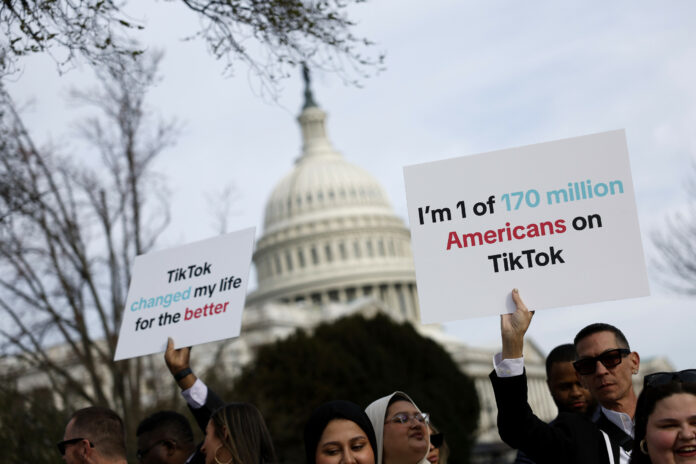Ahead of the House of Representatives’ vote to pass a bill that would ban short video-sharing app TikTok if it fails to separate from its Chinese parent company, China warned the move would come back to haunt the United States.
Chinese Foreign Ministry spokesperson Wang Wenbin accused lawmakers of “robbery logic” and said Washington risked showing the world it only takes legal action for its own benefit—a line of reasoning one China analyst called ironic, citing Beijing’s heavy censorship apparatus.
The controversy over TikTok centers on national security concerns. Critics point out its parent company, ByteDance, could share user data with the Chinese government. The bill would compel TikTok to divest from ByteDance within six months, seeking to mitigate the risk of data theft or Chinese Communist Party influence over American users.
Beijing’s 2017 National Intelligence Law requires all Chinese companies and citizens to hand over information to the government upon request.
“The bill passed by the U.S. House of Representatives puts the U.S. on the opposite side of fair competition and international trade rules,” Wang said at the Chinese foreign ministry’s daily press conference Thursday.
He then accused the U.S. of trying to pry away a Chinese innovation for its own benefit: “So-called ‘national security reasons’ can be used to suppress other excellent companies at will. That’s unfair and unjustifiable. When you see something good from others, you try to make it your own. This is robbery logic.”
Wang said the U.S. handling of the TikTok issue would demonstrate whether Washington’s “so-called rules and regulations” are beneficial to the world or only to the U.S.
“Such practice of resorting to hegemonic moves when one could not succeed in fair competition disrupts the normal operation of businesses, undermines the confidence of international investors in the investment environment, sabotages the normal economic and trade order in the world and will eventually backfire on the U.S. itself,” he added.
Newsweek reached out to the Chinese foreign ministry and TikTok with written requests for comment.
“Beijing’s unelected government is in no position to oppose Washington’s possibly demanding that TikTok’s U.S. operations be divested from any mainland Chinese entity when the People’s Republic of China itself outright bans Facebook, Twitter, and heavily censors its own Internet providers,” Sean King, Asia scholar and senior vice president of New York-based consultancy Park Strategies, told Newsweek.
The bill was approved in the lower chamber Wednesday by a vote of 352-65 and will next head to the Senate. President Joe Biden has said he’d sign the bill if it passed both houses of Congress.
“We hope the Senate takes action and takes this up very quickly,” White House spokesperson Karine Jean-Pierre said at Wednesday’s press briefing.
Responding to the House vote, TikTok CEO Shou Chew said in a social media post Wednesday: “This bill gives more power to a handful of other social media companies.”
It will also deprive creators and small businesses of billions of dollars and risk over 300,000 U.S. jobs, he warned.
TikTok has over 150 million active users in the U.S. and boasts nearly 2 billion users worldwide. This does not include China, where it is not accessible without using a virtual private network (VPN). Instead, the ByteDance’s China-specific version of the platform, Douyin, reigns supreme.
The House vote comes amid rising security concerns in a number of countries over the national security risks posed by the Chinese government and companies beholden to them.
TikTok is already banned from phones issued by the U.S. federal government and over half of state governments. Canada, the United Kingdom, and the European Union have also instituted TikTok bans on official devices.
India banned the app from its 1.4-billion-strong market in 2020 over privacy and security concerns.
Uncommon Knowledge
Newsweek is committed to challenging conventional wisdom and finding connections in the search for common ground.
Newsweek is committed to challenging conventional wisdom and finding connections in the search for common ground.


